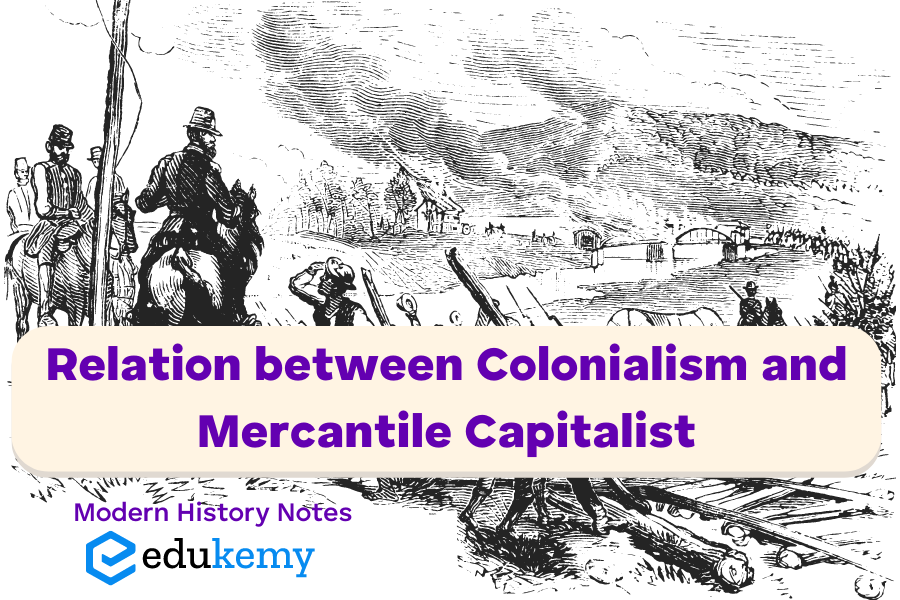
Mercantile capitalism and colonialism were intimately connected, especially in the context of British policy in the 18th century. Here’s how they were interrelated:
- Mercantile Capitalism Policy: Mercantile capitalism was a economic policy pursued by the British government in the 18th century. Under this policy, the government sought to regulate both the domestic economy at home and the economic activities in its colonies abroad. The goal was to enhance national power through economic control.
- Regulation of Trade: Mercantile capitalism involved implementing trade barriers and granting trade monopolies to British companies, particularly in the colonies. This ensured that the colonies were economically dependent on Britain and contributed to a favorable balance of payments for the British.
- Trade Monopolies: British companies were given exclusive rights to trade with the colonies. This meant that they had a monopoly on the trade in those regions, excluding other foreign companies from participating in this economic activity.
- Colonization as a Result: When native rulers and chiefs resisted these policies, colonial powers often resorted to direct colonization of these regions. This was a means to secure and further solidify their economic dominance.
- Transition to Laissez Faire: In the 19th century, a shift occurred with the influence of thinkers like Adam Smith. The policy of Laissez Faire, which advocated for less government intervention in the economy, gained prominence. However, this was primarily applied to domestic economies, and colonial territories continued to be subject to special economic privileges granted to imperial powers.
- Special Economic Rights in Colonies: Imperial powers, including Britain, retained special economic rights in their colonies. Companies from other countries did not enjoy equal economic privileges in these regions. Economic projects and contracts were often reserved for companies belonging to the imperial power.
- Decline of Laissez Faire: By the end of the 19th century, the practice of Laissez Faire began to decline. This was in part due to the negative consequences associated with it, such as worker exploitation and the lack of government intervention during crises like famines.
- Role of State Intervention: The realization emerged that unbridled Laissez Faire could lead to violations of basic human rights. As a result, it became apparent that the state needed to intervene to safeguard the well-being of its citizens.
In summary, colonialism was closely tied to the economic policies of mercantile capitalism, as it provided a means for imperial powers to exert economic control over their colonies. While the transition to Laissez Faire introduced new economic ideologies, it did not significantly alter the economic dynamics between colonial powers and their colonies.
Contents
- 1 FAQs
- 1.1 1. What is the connection between colonialism and mercantile capitalism?
- 1.2 2. How did colonialism facilitate the growth of mercantile capitalism?
- 1.3 3. What role did colonial trade play in the development of mercantile capitalism?
- 1.4 4. How did colonialism shape the power dynamics of mercantile capitalism?
- 1.5 5. What were the long-term consequences of the relationship between colonialism and mercantile capitalism?
- 2 In case you still have your doubts, contact us on 9811333901.
FAQs
1. What is the connection between colonialism and mercantile capitalism?
Colonialism and mercantile capitalism are deeply intertwined systems that emerged during the same historical period. Mercantile capitalism, characterized by the dominance of merchant capitalists who sought to accumulate wealth through trade, was fueled by colonial expansion. Colonies provided a steady supply of raw materials and served as captive markets for manufactured goods, enabling merchant capitalists to amass significant profits.
2. How did colonialism facilitate the growth of mercantile capitalism?
Colonialism provided merchant capitalists with access to vast resources and markets that were essential for the expansion of mercantile capitalism. European powers established colonies primarily to extract valuable resources such as precious metals, spices, and agricultural products, which were then exported to the mother country for processing and sale. This economic exploitation formed the foundation of mercantile capitalism, allowing merchant capitalists to accumulate wealth and power.
3. What role did colonial trade play in the development of mercantile capitalism?
Colonial trade was the lifeblood of mercantile capitalism, as it provided merchant capitalists with lucrative opportunities for profit. Colonies served as sources of cheap labor and raw materials, enabling European merchants to manufacture goods at low costs and sell them at inflated prices in both colonial and domestic markets. The triangular trade, which involved the exchange of goods between Europe, Africa, and the Americas, further enriched merchant capitalists and fueled the growth of mercantile capitalism.
4. How did colonialism shape the power dynamics of mercantile capitalism?
Colonialism enabled European powers to establish hegemony over vast territories and populations, granting merchant capitalists privileged access to resources and markets. This unequal distribution of power allowed European merchants to dominate global trade networks and amass immense wealth at the expense of colonized peoples. Additionally, colonial governments often enacted policies that favored the interests of merchant capitalists, further consolidating their economic and political influence.
5. What were the long-term consequences of the relationship between colonialism and mercantile capitalism?
The relationship between colonialism and mercantile capitalism had far-reaching consequences that continue to impact societies today. Colonialism facilitated the transfer of wealth from colonized regions to European powers, perpetuating global inequalities and exacerbating economic disparities. Furthermore, the legacy of colonialism has left lasting social and cultural divisions, as well as ongoing patterns of exploitation and underdevelopment in former colonies. Overall, the relationship between colonialism and mercantile capitalism underscores the enduring legacy of imperialism and its role in shaping the modern world order.
In case you still have your doubts, contact us on 9811333901.
For UPSC Prelims Resources, Click here
For Daily Updates and Study Material:
Join our Telegram Channel – Edukemy for IAS
- 1. Learn through Videos – here
- 2. Be Exam Ready by Practicing Daily MCQs – here
- 3. Daily Newsletter – Get all your Current Affairs Covered – here
- 4. Mains Answer Writing Practice – here

